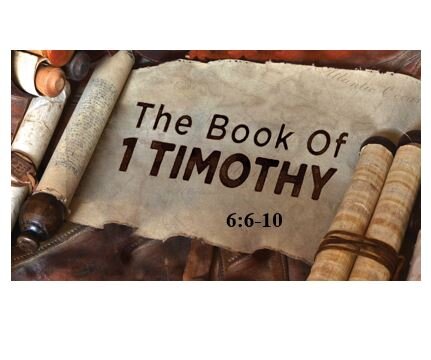BIG IDEA:
CONTENTMENT PROTECTS AGAINST THE SNARES OF MATERIALISM
I. (:6) THESIS: CONTENTMENT CONTRIBUTES GREATLY TOWARDS GODLINESS
A. Review: The Pursuit of Godliness Can be Misguided (Apart from Contentment)
Remember the False Teachers from vs. 5:
“who suppose that godliness is a means of gain”
B. The Goal Must be Spiritual Gain Not Material Gain
“But godliness actually is a means of great gain”
C. Contentment Makes the Difference
“when accompanied by contentment”
Phil. 4:12-13
II. (:7-8) CONTENTMENT EMBRACES GOD’S PLAN FOR OUR SUCCESS
A. (:7) Nature Proves the Futility of Materialism (cf. Job 1:21)
1. Our Birth — Look at our Entrance into this Earthly Life
“For we have brought nothing into the world”
2. Our Death — Look at our Departure from this Earthly Life
“so we cannot take anything out of it either”
Kent: “Thus the gaining of material acquisitions must be of only temporary significance. Therefore, the few things we actually need while on earth need not unduly disturb the minds of godly people.”
B. (:8) God Provides the Essentials for Contentment
“And if we have food and covering, with these we shall be content”
Stedman: “The apostle says all we need is food and clothing — provision for the maintenance of life (food), and protection from the elements that would destroy life (shelter and clothing). God provides those for us, and with that simple lifestyle man can be content. That is what Jesus meant when he said, “Man shall not live by bread alone, but by every word that proceeds out of the mouth of God,” {Matt 4:4 RSV}. It is the knowledge of God that gives contentment; it is fellowship with the Lord of Glory that makes the heart rejoice, giving us peace and a sense of worth and security. That is the true contentment, Paul says.”
III. (:9-10) MATERIALISM OPENS ONE UP TO A WIDE RANGE OF DESTRUCTIVE TEMPTATIONS
A. Materialism is Defined at the Motivational Level
1. “those who want to get rich”
2. “the love of money”
B. Materialism and Temptation Are Directly Linked
1. “fall into temptation” — indicates a yielding to that temptation
2. “and a snare” — catching the victim in a trap
3. “and many foolish and harmful desires”
Kent: “Such lusts are senseless (anoetous) for they canot be logically defended, nor do they bring real satisfaction. They are also harmful (blaberas), for they do great damage to one’s character and spiritual life, and they dissipate one’s energies and call away one’s interest from spiritual activity.”
4. “root of all sorts of evil”
Stedman: “When you are living to be rich, breathing it every day, working at it as your great objective, that, Paul says, is a deep root of evil in your life. You know what a root is. If you find a big, luxuriant weed growing in your back yard and you cut it down, although it looks like you have gotten rid of the weed you have not because the root is still there. After a while the root will send forth another shoot, and if you are not Johnny-on-the-spot, soon there will be another weed the same size or bigger than the first one. That is what the love of money is like, the apostle is saying. You can eliminate some of the problems that it creates but there will be another one along very shortly, because the root is still there, constantly producing evil in your life, creating situations that are disastrous to you and to others.”
C. Materialism Can Result in a Course of Destruction
1. “which plunge men into ruin and destruction”
Hendriksen: “Note the progressive and climactic character of the movement which is portrayed here. First, these men are described as desiring the wrong thing, namely, material wealth. Soon they lose their footing and fall into temptation and a snare and numerous senseless and hurtful cravings. Finally, these cravings plunge them into ruin and destruction. Wretched men! They have guided their vessel to the very brink of the cataract, which, in its turn, plunges them into the awesome depths.”
2. “some by longing for it have”:
a. “have wandered away from the faith”
b. “and pierced themselves with many a pang”
Hiebert: “The Christian faith which they once professed has become displaced by their love for money as the chief goal of their lives. Added to this fateful negative loss is the positive damage of self-inflicted sorrow, ‘and have pierced themselves through with many sorrows.’ In their eagerness to pluck the fair flower of wealth they have pierced and wounded themselves with its sharp, unsuspected thorns. A condemning conscience assails them and destroys their happiness, while they suffer under their poignant disillusionment.”

